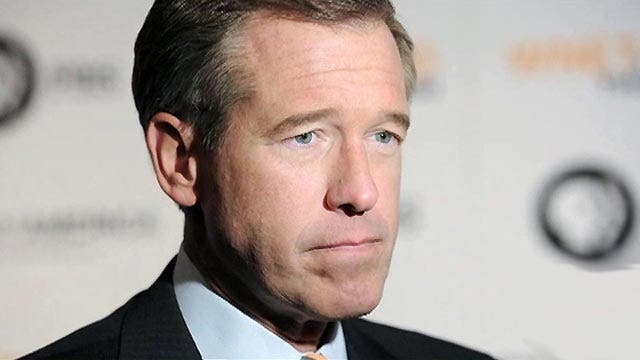CNN has “revised” its report about NBC News anchor/managing editor Brian Williams this morning when the pilot who'd said Williams was in his helicopter and did take small arms fire, now says he isn't sure.
"The pilot was there but several other soldiers said Brian was on our aircraft and this morning he is questioning his own memories," CNNs media critic Brian Stelter announced to viewers this morning, adding that Krell now says his nightmares of Iraq have resurfaced and he is no longer standing by his story.
In marked contrast, Stars and Stripes, which broke news that Williams account of his experience in the early days of the Iraq war in ’03 was not truthful, told Deadline it stands by its story:
“The account given by our five sources, all crew members there at the time, and now pilot Chris Simeone's public statements, all mesh. They also differ dramatically with the account of both Krell and Williams. We have went back and double-checked and our sources dispute Krell's account. We're confident with our sourcing and that our reporting is accurate.”
Stelter told viewers he now wishes he had not aired Krell's comments yesterday, but insisted he’d vetted the pilot. "He said repeatedly that his memories were very clear, but now says hes questioning his own memories,” Stelter said. “He's revising his story so we want to make sure were revising ours."
Former chief warrant officer Rich Krell, told CNN yesterday — exclusively — he was the pilot of the Chinook helicopter that Brian Williams was riding in back in 2003 and that their chopper was indeed hit by small arms fire. Krell said the lead chopper in their group was hit by a rocket-propelled grenade. These new details added confusion yesterday to the story in which Williams has been blasted for not telling the truth about the RPG hitting his helicopter.
“Mr. Williams was on board my aircraft. We took small arms fire,” the pilot, former chief warrant officer Rich Krell, told CNN. “All I know is one RPG was fired. It struck the lead aircraft, which was about what we call six rotor disks in front of me.”
Those incoming bullets, he said “struck the belly up in the forward cabin area and one or two other side hits, but it didn’t cause any major damage, just some minor damage to electronic components.” Asked if Williams was aware that the helicopter he was riding in had been hit by small arms fire, Krell said: “The door gunners were returning fire. M60s (machine guns) are very loud. The pings of the bullets hitting us…there were only a few, but it’s a distinct sound.”
Krell’s account of the incident stands in marked contrast to Stars and Stripes’ interviews with several crew members on the 159th Aviation Regiment’s helicopter was struck by the RPG. They said Williams was nowhere near that aircraft or two other Chinooks flying in the formation that took fire.” Stars and Stripes reported Wednesday that “Williams arrived in the area about an hour later on another helicopter after the other three had made an emergency landing," the crew members said. And, on Wednesday, Sgt. 1st Class Joseph Miller, who was the flight engineer on the aircraft that carried the journalists, told Stars and Stripes: "No, we never came under direct enemy fire to the aircraft.”
“Some of things he’s said are not true. But some of the things they’re saying against him are not true either,” Krell told CNN yesterday of the Stars and Stripes report, in defense of Williams. According to Krell, three helicopters were flying in close formation, not four, as Williams had said; one of the choppers broke down, Krell said. Williams was in the back of Krell’s aircraft along with three other NBC staffers, Krell said. He referred to his Chinook as the “second bird” in the formation. The “first bird,” right in front of the “second bird,” was struck by the RPG.
All three of the helicopters were hit by small arms fire, Krell said; his helicopter was hauling metal bridges, which “took most of the hits.”
He said the three Chinooks took evasive maneuvers and his helicopter dropped off its payload, then met up with the other two about 45 minutes later. Williams’ claim his helicopter came under attack and was hit — “that is a true statement,” Krell said, adding, “We were all scared. That’s the truth…He was there at the time of the attack.”
Several times in since that day in 2003, Williams has said that he was aboard a U.S. Army helicopter when it was hit by an RPG on one of the first days of the Iraq War in 2003. He acknowledged on last nights newscast he actually was in a different helicopter than the one hit by the rocket propelled grenade.
NBC News has remained mum on the incident since Stars and Stripes broke the story that Williams’ account of taking an RPG hit — a story he’s been telling for years — was not true.
In its report update, Stars and Stripes notes Williams admitted on air that he was not on the Chinook that was struck by enemy fire. But the publication took Williams to task for saying he was instead on a following aircraft, reporting that Army flight crews said the NBC anchor was actually flying with a different helicopter company altogether in a different direction, and linked to the attacked unit by radio only. The publication called it “another example of the anchor muddling the facts or providing misleading details” of the incident that he covered in the opening days of the Iraq invasion.















































